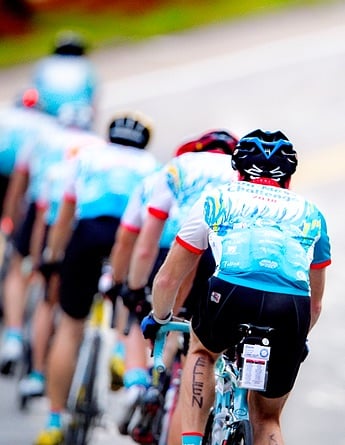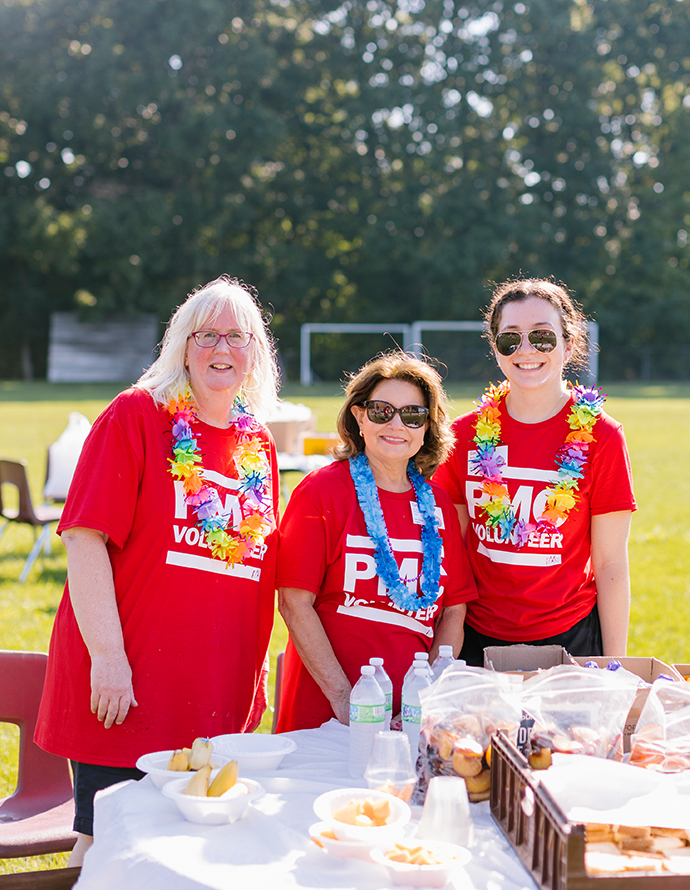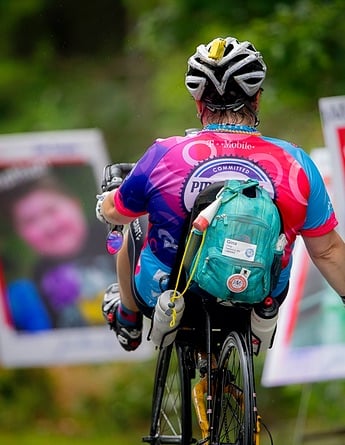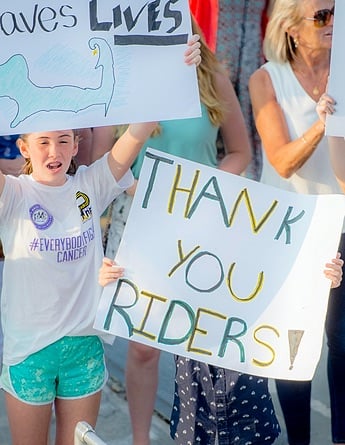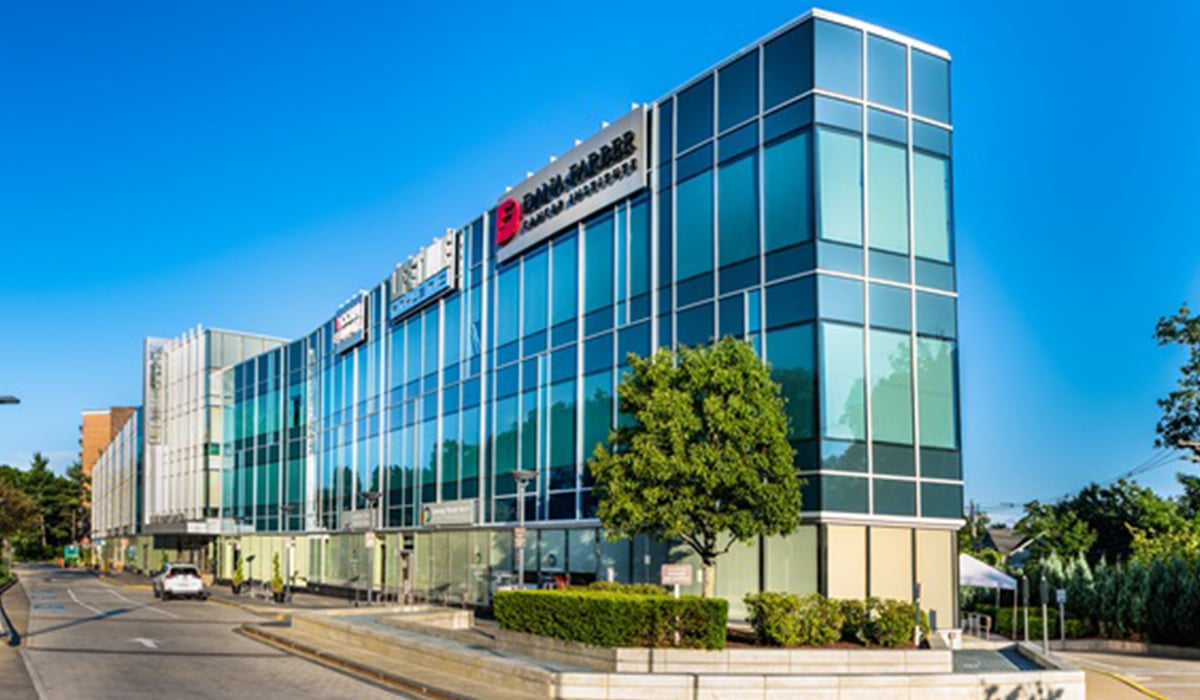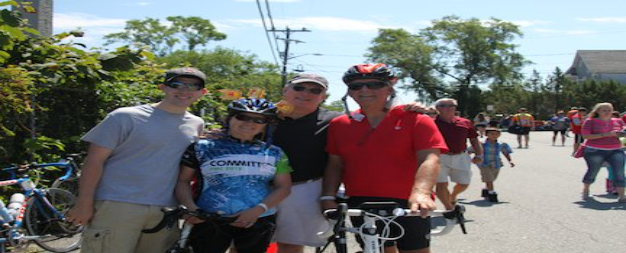More than 600 PMC Heavy Hitters, sponsors, and guests gathered on Friday, May 10, for the PMC Heavy Hitter Evening at Encore Boston Harbor. The speaking program served to thank and inspire attendees as we look ahead to PMC 2024. Read Dr. Craig Bunnell's speech and watch the full program, which is split into two videos, below.
Dr. Craig Bunnell's Speech – 2024 PMC Heavy Hitter Evening
Good evening. I want to start by thanking you for being PMC Heavy Hitters—which really means thanking you for your commitment to the Dana-Farber and our mission to defy and defeat cancer. I was honored when Billy and Meredith asked me to speak tonight about the impact of your actions.
I don’t need to tell you what a remarkable experience the PMC is and what it does for you. You all know that. You know what it is like to be surrounded by people who share a common mission and commitment. To ride and speak with strangers who are patients themselves, or family members or friends of people who had cancer and may be survivors or who may have lost those loved ones—and are channeling their loss into something that decreases the chance that their experience will happen to someone else they don’t even know. You know what it is like to ride through a gauntlet of people lining the road over almost 200 miles who came out before dawn to cheer you on. To hold up signs about how they are 7 or 8 or 20 because of you. It is a feeling of community and connection to each other that we don’t often get to experience in our lives. You know what it’s like, when your knees are aching to look over and find yourself riding next to someone who’s riding with a prosthetic leg or a dad who has a picture of his cute, bald 6-year-old on the back of his jersey. The heroism of the other riders teaches life lessons.
But tonight, we are celebrating you and your commitment to the PMC and the Dana-Farber. So, I want to tell you about the impact of your commitment.
First, cancer research and treatment have changed dramatically in the last twenty years and the pace of that change has been accelerating exponentially. And the Dana-Farber has been integral—and essential—to that change and has, in fact, helped to drive that change. As the largest single contributor to the Dana-Farber, the PMC has allowed the Institute to be the driver of change and accomplish what it has. There’s not really anything that the Dana-Farber has accomplished that isn’t, in some way, attributable to the PMC. Most of the funds raised primarily support research, but some also support unreimbursed clinical services, like the Zakim Center for Integrative Therapies. The PMC has also helped support our Cancer Care Equity Program, helping to alleviate health disparities and increase access for historically marginalized communities. It has helped us to recruit the best faculty of researchers and clinicians in the world and create the best oncology training programs anywhere. None of those would have happened without the PMC.
- And our statement on our commercials that what we do here, changes lives everywhere, is not hyperbole. One historical example is Dana-Farber’s discovery of a protein called PD-L1 that blocks the body’s immune response to tumor cells, which helped to launch a new class of drugs called “immune checkpoint inhibitors” that have revolutionized cancer immunotherapy. You’ve seen these ads on TV. These checkpoint inhibitors have changed the treatment and prognoses of lung, breast, kidney, bladder, melanoma, lymphoma, stomach, rectal and other cancers I am sure I am missing.
- Also supported by PMC funding: last year, for the first time in more than 20 years, a new treatment was identified for gliomas, brain tumors. In a global phase 3 clinical trial led by Dana-Farber, the new precision therapy more than doubled progression-free survival. That was the impact of your commitment.
Of the cancer drugs approved by the FDA in the last 5 years, the Dana-Farber has had its fingerprints, from the laboratory development to the clinic research to get them approved, all over more than half of them. That is the impact of your commitment. In the last year alone:
- There were 40 new oncology drug approvals, 12 of which were first-in-human molecules. The Dana-Farber had a hand in many of these. That was the impact of your commitment.
- We have developed drugs that target very specific mutations in certain cancers, including lung cancer. This one is near and dear to my heart, as my older brother’s wife, after progressing on chemotherapy and immunotherapy with her metastatic lung cancer and having her survival measured in weeks, lived another 4 years on one of these agents that we helped develop.
- And I could continue with these scientific and therapeutic achievements.
Your commitment has allowed the Dana-Farber to build one of the nation’s largest clinical trials programs, with more than 1,100 trials.
And there’s more coming. This is the most exciting time in cancer care and research that we have ever witnessed. There has never been a time of such optimism in oncology.
PMC sponsorship of research is allowing our researchers to target and drug what was once considered undruggable.
These efforts require support. So, while it is the best of times in oncology, it is also the worst of times. Governmental funding is under threat. It is very hard to get grants to do early research, particularly if you are a younger researcher without a track record of grants. Industry generally doesn’t sponsor early scientific work because it is really focused later in the process, on the development of drugs that will yield benefits for patients, but also revenue for shareholders. So, what is essential, is the ability to fund the research that is the most innovative, and to fund researchers who are outstanding, but may not yet have a track record. And those are the types of things that the PMC does. There are few other sources for funding that research that ultimately will move the field forward and lead to new discoveries and treatments.
I’ll finish with a note of gratitude. To Billy, to Meredith, to Jarrett, to all of you that recognize what an extraordinary mission the PMC has. That recognize what the PMC does, which is really, to move the field of cancer forward, to not just speed the development of new treatments, but to create the environment that makes that development happen, and ultimately—the real-world effect of sparing suffering, of keeping parents with their children, siblings with each other, giving friends and families more time together, ultimately to saving lives. I recently read The Book of Joy, which documented a meeting between the Archbishop Desmond Tutu and the Dali Lama. In it, there’s a statement that the best way to create good karma with the least effort is to rejoice in your good deeds and those of others. Rejoicing in them predisposes us to repeat those good deeds in the future. So, tonight, may you all rejoice in your and each other’s good deeds and may you repeat them again this August. I’ll see you there.
Watch the PMC Heavy Hitter Evening – Part 1
Part 1 features:
- Billy Starr – PMC Founder and Executive Director
- Jarrett Collins – PMC CEO
- Dr. Craig Bunnell – Chief Medical Officer of Dana-Farber Cancer Institute, Medical oncologist in the Susan F. Smith Center for Women's Cancers at Dana-Farber, Associate Physician at Brigham and Women's Hospital, Associate Professor of Medicine at Harvard Medical School, 10-Year PMC rider
Watch the PMC Heavy Hitter Evening – Part 2
Part 2 features:
- Meredith Beaton Starr – PMC Director of Stewardship and Liaison to DFCI
- Dr. David Barbie – Director of the Lowe Center for Thoracic Oncology at Dana-Farber Cancer Institute, Associate Professor of Medicine, Harvard Medical School, Associate Director, Belfer Center for Applied Cancer Science, 7-Year PMC rider
- Diane Legg – Founder and President of LUNGSTRONG, 13-Year Living Proof rider



